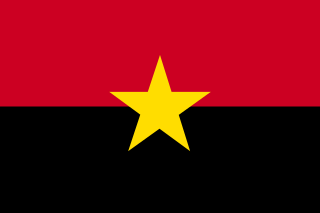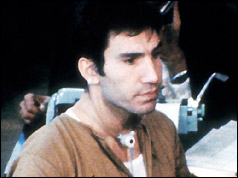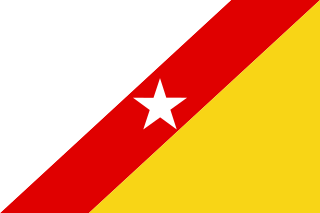Related Research Articles

Angola was first settled by San hunter-gatherer societies before the northern domains came under the rule of Bantu states such as Kongo and Ndongo. In the 15th century, Portuguese colonists began trading, and a settlement was established at Luanda during the 16th century. Portugal annexed territories in the region which were ruled as a colony from 1655, and Angola was incorporated as an overseas province of Portugal in 1951. After the Angolan War of Independence, which ended in 1974 with an army mutiny and leftist coup in Lisbon, Angola achieved independence in 1975 through the Alvor Agreement. After independence, Angola entered a long period of civil war that lasted until 2002.

The People's Movement for the Liberation of Angola, for some years called the People's Movement for the Liberation of Angola – Labour Party, is an Angolan social democratic political party. The MPLA fought against the Portuguese Army in the Angolan War of Independence from 1961 to 1974, and defeated the National Union for the Total Independence of Angola (UNITA) and the National Liberation Front of Angola (FNLA) in the Angolan Civil War. The party has ruled Angola since the country's independence from Portugal in 1975, being the de facto government throughout the civil war and continuing to rule afterwards.

The National Front for the Liberation of Angola is a political party and former militant organisation that fought for Angolan independence from Portugal in the war of independence, under the leadership of Holden Roberto.

The Angolan War of Independence, known as the Luta Armada de Libertação Nacional in Angola, began as an uprising against forced cultivation of cotton and evolved into a multi-faction struggle for control of Portugal's overseas province of Angola among three nationalist movements and a separatist movement. The war ended when a peaceful coup in Lisbon in April 1974 overthrew Portugal's Estado Novo dictatorship and the new regime immediately stopped all military action in the African colonies, declaring its intention to grant them independence without delay.

Costas Georgiou, also known by his alias Colonel Callan, was a Cypriot-born British mercenary executed in Angola following the Luanda Trial for activities during the civil war phase of the Angolan War of Independence.
The following lists events that happened during 1975 in South Africa.

Álvaro Holden Roberto was an Angolan politician who founded and led the National Liberation Front of Angola (FNLA) from 1962 to 1999. His memoirs are unfinished.

The Angolan Civil War was a civil war in Angola, beginning in 1975 and continuing, with interludes, until 2002. The war began immediately after Angola became independent from Portugal in November 1975. It was a power struggle between two former anti-colonial guerrilla movements, the communist People's Movement for the Liberation of Angola (MPLA) and the anti-communist National Union for the Total Independence of Angola (UNITA).

Operation Savannah was the South African code name for their military incursion into Angola in 1975–1976. It was part of the South African Border War and arose due to the Angolan War of Independence. The operation also materially influenced the subsequent Angolan Civil War. South African forces invaded deep into Angola with the objective of driving the MPLA, Soviet and Cuban forces out of southern Angola so as to strengthen the position of UNITA, the main opponent of the MPLA and an ally of South Africa.
The Alvor Agreement, signed on 15 January 1975 in Alvor, Portugal, granted Angola independence from Portugal on 11 November and formally ended the 13-year-long Angolan War of Independence.
Military Council for Angolan Resistance was a militant organization that fought in the Angolan Civil War in the 1980s.

Angola and Israel established diplomatic relations in 1993. In 1995, Israel opened an embassy in Luanda and in 2000, Angola opened an embassy in Tel Aviv.

Relations between Angola and China predate the former's independence. Today, they are based on an emerging trade relationship. As of 2021, Angola was China's third-largest trading partner in Africa. The two countries announced a comprehensive strategic partnership in 2024.

The Cuban intervention in Angola began on 5 November 1975, when Cuba sent combat troops in support of the communist-aligned People's Movement for the Liberation of Angola (MPLA) against the pro-western National Union for the Total Independence of Angola (UNITA) and National Liberation Front of Angola (FNLA). The intervention came after the outbreak of the Angolan Civil War, which occurred after the former Portuguese colony was granted independence after the Angolan War of Independence. The civil war quickly became a proxy war between the Eastern Bloc led by the Soviet Union and the Western Bloc led by the United States. South Africa and the United States backed UNITA and the FNLA, while communist nations backed the MPLA.
In the Angola–Cuba Declaration of 1984, signed 19 March 1984 in Havana by president José Eduardo dos Santos of Angola and Fidel Castro, premier of Cuba, the two countries agreed to the withdrawal of Cuban forces from Angola after the withdrawal of South African troops from Angola and Namibia, and after UN-Security Council resolution 435 on Namibian independence was strictly applied.

The People's Republic of Angola was the self-declared socialist state which governed Angola from its independence in 1975 until 25 August 1992, during the Angolan Civil War.

The Revolutionary Government of Angola in Exile was a self-proclaimed government-in-exile based in Léopoldville in the Democratic Republic of the Congo during the Angolan War of Independence. It was led the National Liberation Front of Angola and its president was Holden Roberto. The GRAE was founded in April 1962 and had its armed forces stationed in the Congo where it also conducted military training. Congolese aid to the GRAE was gradually reduced once Moïse Tshombe became prime minister. In July 1964, the Foreign Minister of GRAE, Jonas Savimbi, resigned.
Liga Geral dos Trabalhadores de Angola was an Angolan trade union organization in exile. Being based amongst Angolan refugees in neighbouring Congo-Kinshasa, LGTA was linked to the National Liberation Front of Angola (FNLA). During the 1960s, LGTA was the largest Angolan trade union outfit.

Not to be confused with the internationally recognised, MPLA dominated People's Republic of Angola